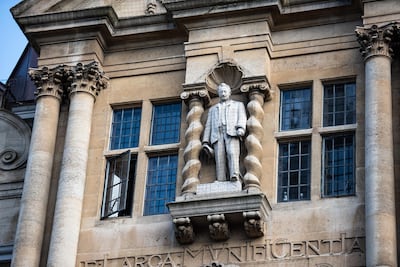The Rodin Museum in Paris is a century old and celebrates the work of France's best-known sculptor. You can buy copies of his most famous work The Thinker, a work so well known it's been parodied and turned into posters that adorn many a student bedroom. But even as a fan of Auguste Rodin, Constantin Brancusi, Henry Moore, Antony Gormley, Hans Arp and a host of other sculptors, I have never given much thought to all those other sculptures and bronzes – the statues of former heroes on plinths in the central squares of British cities.
General Who? Lord What? Never heard of them. And yet British newspapers, not known for their interest in art criticism, are suddenly full of the strong opinions from those who are very vocal about a few statues of men – always men – who are often obscure historical figures.
One is Edward Colston. I had no idea who he was until his statue was dragged through the streets of Bristol in June last year and thrown into the harbour as part of the Black Lives Matter protests. It came after the death in Minnesota of George Floyd. Colston was known in Bristol as an 18th-century philanthropist who gave away his fortune. But that fortune was built upon the slave trade, and this inconvenient truth led to his bronze likeness being sprayed with paint, toppled and finally given its cold water bath.
Rescued from the water, the statue is currently lying horizontally in a Bristol museum. Shawn Sobers, a historian at the University of the West of England, says the toppled statue is "a more accurate reflection of what it is now", a forlorn, toppled heap of graffiti-covered bronze. Bristolians are being asked what to do with it permanently as a memorial to a man who profited from misery, selling human beings as if they were mere commodities.
Cecil Rhodes is the other historical figure whose statue remains a problem. He is regarded as the epitome of British Victorian imperialism, and his likeness stands brooding over Oriel College, Oxford, despite the campaigners known as “Rhodes Must Fall".
Anti-Rhodes protests began in 2015 in South Africa with the aim, as the protesters put it, of "decolonising" education. Revisionist histories of the British empire – the accounts of those colonised rather than the triumphs of colonisers – have caused considerable anger among those on the English political right, who claim they are "denying our history".
Rhodes famously said that being an Englishman was to “win the lottery of life", and also this: “Ask any man what nationality he would prefer to be, and ninety-nine out of a hundred will tell you that they would prefer to be Englishmen.”
Oriel College set up a commission to decide what should happen to the contentious statue, but when a majority of commission members supported the statue's removal, the college said no. It claimed this was due to costs and unspecified "complex" planning processes. This hardly seems credible. Plenty of campaigners would remove the statue for free. Gormley suggested an ingenious solution, that the statue should stay in place but be turned to face the wall. This, Gormley says, would be "an acknowledgment of collective shame" and would "reassert the fact that Oriel College and many institutions have property from Rhodes's riches".
All these events are part of a long-running "culture war" in Britain, amid government attacks on universities and some historians for being – in their pejorative word – "woke". Perhaps they think it better to be "asleep".
In February, British Culture Secretary Oliver Dowden told museum and heritage groups that we "must defend our culture and history from the noisy minority of activists constantly trying to do Britain down". The British culture secretary appears to have an odd view of culture as something to be "defended" against historians debating the troubled legacy of empire. Mr Dowden also seems to confuse history with heritage. History is always dynamic and changing as new historians re-evaluate past events. Heritage is the accretion of all those bits and pieces, stately homes, statues of former heroes, arches and monuments that we visit as tourist attractions or pass by on our way to work generally without much thought.
One of Britain’s most famous historians of recent years, Norman Davies, made the difference clear: “History is all about change and conflict. It is not a comfortable subject. Heritage … was developed as an idea for preserving the memories of the past in a prim, static mode, which would appeal to the casual tourist but not to anyone interested in past realities.”
Davies is correct. Mr Dowden is out of his depth. No one is “trying to do Britain down” by recognising some of the shameful events of the past and the shameful men who have been treated as heroes. What really does “do Britain down” is the failure by government ministers to see that re-evaluating the past is better than being stuck in a blinkered one-sided version of it.
Gavin Esler is a broadcaster and UK columnist for The National



